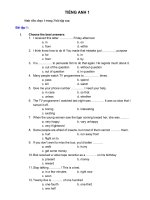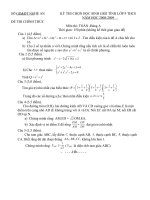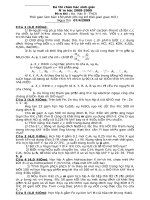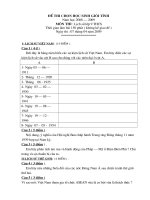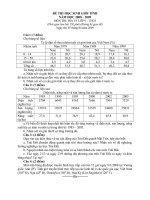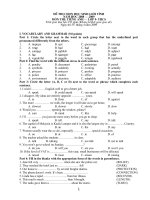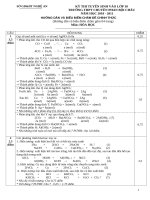De thi HSG Tinh mon Tieng Anh 9doc
Bạn đang xem bản rút gọn của tài liệu. Xem và tải ngay bản đầy đủ của tài liệu tại đây (141.59 KB, 5 trang )
<span class='text_page_counter'>(1)</span>UBND TỈNH TIỀN GIANG SỞ GIÁO DỤC& ĐÀO TẠO -------------. CỘNG HÒA XÃ HỘI CHỦ NGHĨA VIỆT NAM Độc lập - Tự do – Hạnh phúc ---------------. KỲ THI HỌC SINH GIỎI CẤP TỈNH LỚP 9 Khóa ngày …. tháng 3. năm 2011 Môn TIẾNG ANH Thời gian làm bài: 150 phút ( không kể thời gian giao đề ) ( Đề gồm 5 trang )-------------------------------------------------------------------------------------------. Đề chính thức. PART I : LISTENING COMPREHENSION : ( 2.0 pts ) (Thí sinh nghe 02 đoạn băng mỗi đoạn 02 lần. Bắt đầu phần nghe và kết thúc phần nghe đều có phần nhạc Bản Giao Hưởng Số 9 của Beethoven. Băng đã được ghi đủ số lần, giám thị mở cho máy chạy từ đầu tới cuối không cần trả băng. Toàn bộ khoảng 12 phút. Giữa các đoạn có khoảng im lặng để thí sinh làm bài) Question 1 : Listen to the recording, then fill in the form ( only , , , ) with the correct information. The recording will be played twice: REQUEST FOR SPECIAL LEAVE Name Student number Address. Angela Tung H5712 . Telephone number Course. ….............................................. Tamworth, 2340 8106745. Teacher’s name Student visa expiry date. . ….............................................. Mrs. Green . I wish to request leave in term Dates of leave Number of working days missed . ….............................................. 1/ one May 31st To …............................................... Question 2 : Listen to the recording then pick out ONE best option ( A,B,C or D ) to complete each sentence (from 9 to 12). The recording will be played twice: 9. Why does Angela want to take leave? To ………………. . A. visit her aunt B. see her mother C. meet her husband 10. Where is Angela going? To …………. . A. Tamworth B. Brisbane C. Armidale 11. Who is going with Angela? With ………… . A. her uncle B. her mother C. her aunt 12. When will Angela go home to her own country? A. in two months B. in ten months C. in twelve months. D. guard her family D. Sydney D. her father D. in twenty months.
<span class='text_page_counter'>(2)</span> PART II: READING COMPREHENSION : ( 6.0 pts ) Question 3: Read the passage below, then choose ONE option that best answers or completes each of the questions: The earliest known settlement on Singapore was in the 2nd century AD. It was an outpost of the Sumatran empire, named Temasek ('sea town'). Between the 16th and early 19th centuries, it was part of the Sultanate of Johor, Malaysia. In 1613, Portuguese raiders burnt the settlement down, and the island sank into obscurity for the next two centuries. In 1819, Thomas Stamford Raffles landed on the main island and signed a treaty with Sultan Hussein Shah on behalf of a British Company to develop the southern part of Singapore as a British trading post. Singapore was controlled by a Malay Sultan until August 1824, when John Crawfurd, the second resident of Singapore, made the whole island a British possession by signing a treaty with Sultan Hussein Shah under which the Sultan and the Temenggong handed it over to the British. In 1826 it became part of a British colony. By 1869, 100,000 people lived on the island. During World War II, the Imperial Japanese Army invaded Malaya, culminating in the Battle of Singapore. The British were defeated in six days and surrendered to General Yamashita on 15 February 1942. British Prime Minister Winston Churchill called this "the worst disaster and largest capitulation in British history". The Japanese occupied Singapore until the British repossessed it on 5 September 1945, a month after the Japanese surrender. Singapore's first general election, in 1955, was won by the pro-independence David Marshall, leader of the Labor Front party. Demanding complete self-rule, he led a delegation to London but was turned down by the British. He resigned upon return and was replaced by Lim Yew Hock, whose policies then convinced Britain to grant Singapore full self-government with its own prime minister and Cabinet overseeing all matters of government except defense and foreign affairs. In elections in May 1959 the People's Action Party won a landslide victory and immediately made Singapore a self-governing state, with Lee Kuan Yew as the first prime minister. Governor of Singapore Sir William Goode served as the first Yang di-Pertuan Negara until December 1959, when he was succeeded by Yusof bin Ishak, later first President of Singapore. Singapore declared independence from Britain on 31 August 1963, before joining the new Federation of Malaysia in September along with Malaya, Sabah and Sarawak as the result of the 1962 meeting of Singapore. Tunku Abdul Rahman separated Singapore from the Federation two years later, after heated ideological conflict between the ruling parties of Malaya and Singapore. Singapore gained sovereignty as the Republic of Singapore on 9 August 1965, with Yusof bin Ishak as president and Lee Kuan Yew still as prime minister. In 1970 Singapore joined the Non-aligned movement, and in 1976 it helped found the Association of Southeast Asian Nations. In 1990, Goh Chok Tong succeeded Lee as prime minister. During his tenure, the country faced the 1997 Asian Financial Crisis, the 2003 SARS outbreak, and terrorist threats posed by Jemaah Islamiyah. In 2004, Lee Hsien Loong, eldest son of Lee Kuan Yew, became the third prime minister..
<span class='text_page_counter'>(3)</span> 1. At first, Singapore ………… . A. was a well-known settlement B. was the empire Temasek C. was part of the Sultanate of Johor, Malaysia D. was known in the 2nd century AD 2. Which of the following statements is TRUE ? A. Portuguese raiders sank the island under sea B. Portuguese raiders burnt the settlement down for the next two centuries C. Thomas Stamford Raffles stood for a British company D. Sultan Hussein Shah alone built Singapore as a British trading post. 3. Who made Singapore belong to Britain? A. a Malayan Sultan B. John Crawfurd C. Sultan Hussein Shah D. the Temenggong 4. Winston Churchill called this "the worst disaster and largest capitulation in British history" because .............................. A. the Imperial Japanese Army culminated the battle of Singapore B. The British defeated the Japanese led by General Yamashita in six days C. The British surrendered to the Japanese led by General Yamashita on 15 February 1942. D. The Japanese repossessed Singapore on 5 September 1945 5. Who exactly and directly gained complete self-rule for Singapore successfully? A. David Marshall B. the Labor Front party C. Lim Yew Hock D. Lee Kuan Yew 6. “landslide” in “the People's Action Party won a landslide victory” implies “ very ...............” A. modest B. impressive C. disastrous D. long-lasting 7. Which of the following statements is NOT TRUE ? A. Singapore declared independence from Britain in late August 1963. b. Singapore joined the new Federation of Malaysia before September, 1963. C. Singapore was separated from the Federation by Rahman in 1965. D. Heated conflict between the ruling parties of Malaya and Singapore resulted in separation. 8. Which list acts as a right timeline of Singaporean Prime Ministers from early to now? A. Yusof bin Ishak - Lee Kuan Yew - Goh Chok Tong - Lee Hsien Loong - Jemaah Islamiyah B. Winston Churchill - Lim Yew Hock - Lee Kuan Yew - William Goode - Yusof bin Ishak C. Tunku Abdul Rahman - Lee Kuan Yew - Goh Chok Tong - Jemaah Islamiyah D. Lee Kuan Yew - Goh Chok Tong - Lee Hsien Loong Question 4 : Each verb collocates with its noun only. Match each verb in column A ( 1 – 10 ) with its corresponding noun in column B ( A – J ). There is no extra one. A 1. do 2. play 3. take 4. place 5. make 6. commit 7. spend 8. pay 9. lay 10. tell. B A. sense B. a vacation C. a visit D. sports E. a role F. eggs G. a crime H. the truth I. a flag J. an exam. Question 5 : Fill in each numbered blank with ONE word chosen from the list below to complete the meaning of the passage. There are ten extra ones that we do not need to use..
<span class='text_page_counter'>(4)</span> A. running B. that G. launched H. set M. soil N. jumping. C. solution I. which O. became. D. received J. reached P. area. E. result F. surface K. land L. changing Q. stand R. high. Earth is a lovely blue and green planet. It has air and water. It has land for growing crops and grazing animals. Why would anyone want to leave our planet and live in a space colony? One reason is that Earth is getting overcrowded. In 1950, Earth’s population was 2.5 billion. In 1980, it …( 1 ) ... 4.4 billion. By the year 2050 it may be more than 9 billion. Such a large population will mean less food and less room for each person. One …( 2 )… would be for some of the people to live in space colonies. Another reason is that Earth has only so much oil and natural gas. We are already …( 3 )… low on these fuels. One day we may run out of them altogether. In space, on the other hand, there are almost endless sources of energy. After years of preparation and testing, in the summer of 1969 America was finally ready to … ( 4 ) … a man on the moon. The three astronauts, Neil Armstrong, Edwin “Buzz” Aldrin and Michael Collins, were…. ( 5 ) … aboard the Saturn V rocket on July 16 th, 1969. After a four-day trip to reach the moon, Neil Armstrong and Buzz Aldrin used the lunar module to descend to the moon’s … ( 6 )…. while Michael Collins remained in orbit around the moon in the Command module. After landing on the Moon, Armstrong climbed down the ladder and became the first human being to …( 7 )… foot on the Moon. He was soon joined by Aldrin, and the two men spent more than two hours walking on the lunar surface. They gathered 21 kg of soil samples, took photographs and set up some scientific experiments. When the time came to leave, the astronauts took off from the Moon in the top part of the lunar module and rejoined Michael Collins in the command module, …( 8 )… had been circling above. Then they fired the spacecraft’s main engine and headed back to Earth. PART III : GRAMMAR & VOCABULARY : ( 8.0 pts ) Question 6 : 1. Pick out ONE word that has the underlined syllable pronounced differently from the others in each set: a) fountain, contain , remain, maintain, attain, obtain b) able , disable , enable , capable , table c) handsome, madam, window , sandal , double , salad d) high, plough, though, rough, weigh 2. Pick out ONE word that is of different kind or part of speech from the others in each set: a) heater, typist, beggar, inventor, accountant, mathematician, resident, employee, engineer, guitarist, liar, sailor, fisherman, hunter, musician, student, interviewee b) ETs, aliens, Martians, extra-terrestrials, space invaders, UFOs c) dress, blouse, skirt, hairclip, trunks, purse, bras d) trial, arrival, refusal, digital, proposal Question 7 : Write each verb in the numbered brackets in its correct tense and form: Susan is a ballet dancer. She ….(1. graduate)…. from Cambridge University in 2000 and became a member of the Royal Dance Club in 2005. She …(2. be)… a professional dancer.
<span class='text_page_counter'>(5)</span> since then. She often …(3. perform)… on TV. She travels a lot. So far she …(4. tour)… many countries around Europe. She is married to the journalist Sam Green, and they …(5. have)… two children. They …(6. live)… in Cambridge for seven years, then moved to the United States in 2007. Now they …(7. live)… in Times Square in central New York. We hope that we …(8. come)… and see them in New York some day. Question 8 : Fill in each blank of these sentences with the suitable form of the words in brackets : 1. 2. 3. 4. 5. 6. 7. 8.. He spent most of his ________ in the countryside. (CHILD) Vietnam has a _______ climate that is hot, humid and rainy. (TROPIC) Men make important _________ in family. (DECIDE) To young men and young girls who like wearing jeans, these kinds of clothing look very ________ most of the time. (FASHION) The future promises plenty of factories here because the government wants to ________ this area. (INDUSTRY) Snakes can kill. ________, snakes give birth to many youngs but just a few of them survive. (FORTUNE) Professor Ngo Bao Chau is a well-known ______ . He won many international awards. (MATHEMATICS) This car does not have a lot of devices. It is quite _______ . (COMFORT). Question 9 : Rewrite these sentences, beginning with the words provided in such a way that they remain the same meaning as the original ones : 1. Paul last wrote to Mary when he was at college. Paul hasn’t ……….. 2. A technician is going to mend the plug for her. She is ……….. 3. In spite of his old age, Mr. Wilson swims in the pool every morning. Although ……… 4. They passed the driving test because of the easy questions. If ………. 5. You will catch a cold if you let your feet wet. Unless ……….. 6. They began work for the company 10 months ago. They have ………. 7. “ Why don’t we save energy?” said the professor. The professor suggested that energy ………… 8. “ How did you go to school, Jack ?” said Rose Rose asked ……….. PART IV :WRITING ( 4.0 pts ) Question 10 : Write an essay of about 120- 150 words making suggestions to bring about equality between men and women. Question 11 : What can we benefit from taking a TOEFL-preparation course? Write such a conversation by you and your parents in about 15- 20 conversational exchanges. -------------------------------------------------The end------------------------------------------------------.
<span class='text_page_counter'>(6)</span>
